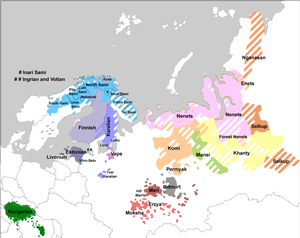Kainuu Sámi
This article needs additional citations for verification. (June 2013) |
| Kainuu Sámi | |
|---|---|
| Native to | Finland |
| Region | Kainuu |
| Ethnicity | Forest Sámi |
| Extinct | by 1800s[1] |
Uralic
| |
| Language codes | |
| ISO 639-3 | None (mis) |
| Glottolog | kain1277 |
Kainuu Sámi is an extinct Sámi language that was once spoken in Kainuu. It became extinct in the 18th century when the Kainuu Sámi began assimilating to the culture of the growing Finnish population.[citation needed] Kainuu Sámi belonged to the Eastern Sámi language group.[citation needed]
In his review of Jaakko Anhava's book Maailman kielet ja kielikunnat ("Languages and language groups of the world", 1998), researcher of Finno-Ugric languages Tapani Salminen stated that the idea of the existence of a Kainuu Sámi language that is separate from Kemi Sámi is not well reasoned.[2]
The original inhabitants of Kainuu were Sámi hunter-fishers.[citation needed] In the 17th century, the Governor General of Finland Per Brahe fostered the population growth of Kainuu by giving a ten-year tax exemption to settlers. It was considered necessary at the time by Finnish authorities to populate Kainuu with Finnish farmers because control over the area was threatened from the east by Russians. Those who settled in Kainuu were mainly from Savonia.
References
[edit]- ^ Irja Seurujärvi-Kar (2011). ""We Took Our Language Back" – The Formation of a Sámi Identity within the Sámi Movement and the Role of the Sámi Language from the 1960s until 2008" (PDF). p. 39. Retrieved 1 October 2024.
...Kainuu Sámi (used until 16th–18th century in the area of the Forest Sámi people in central Finland and in the Republic of Karelia).
- ^ Salminen, Tapani (2000). Uusi suomenkielinen kokonaisesitys maailman kielistä. Virittäjä, No. 1. Page 154. PDF. Retrieved 2022-2-9.

